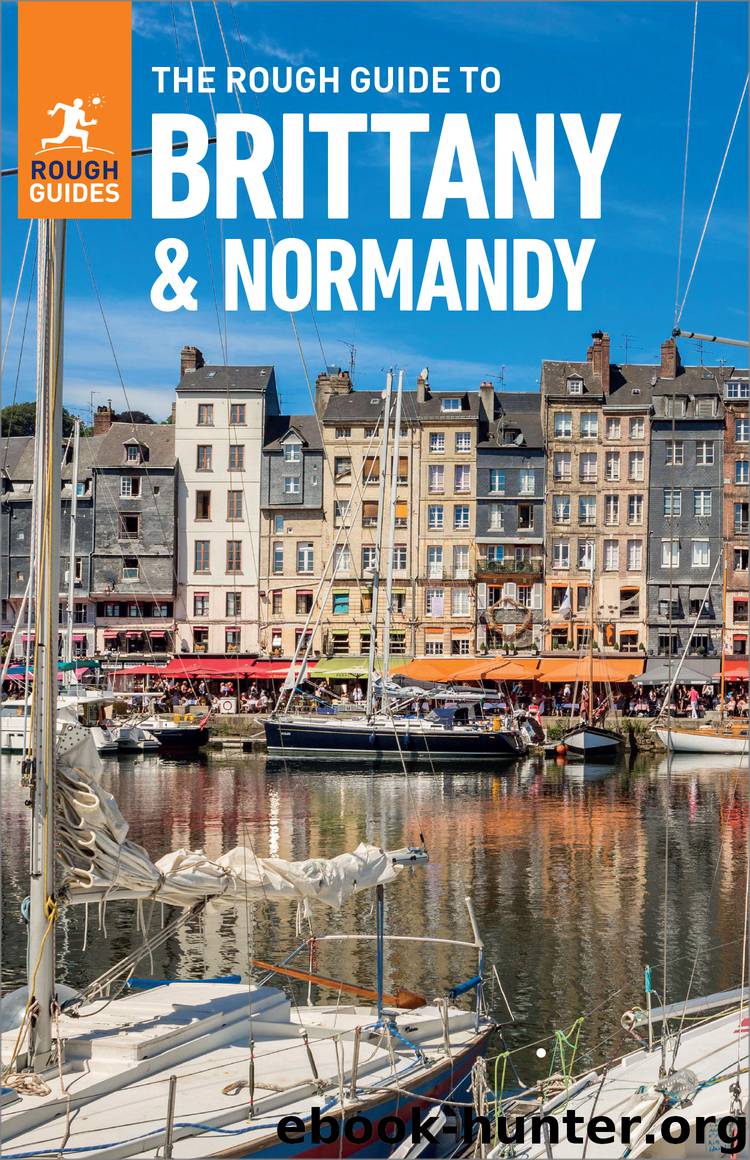The Rough Guide to Brittany & Normandy (Travel Guide eBook) by Rough Guides

Author:Rough Guides
Language: eng
Format: epub
Tags: Travel, France
Publisher: Apa Publications
Published: 2019-01-10T10:10:15+00:00
City Centre
Rennes’ original medieval core, bordered by the canal to the west and the river to the south, was enclosed long before 1422. As much as a thousand years earlier, it was already known as the “ville rouge” on account of the red bricks used in its walls. Those walls were enlarged in 1440, when the Porte Mordelaise was constructed to serve as the ceremonial entrance to the city. While the gateway itself is now hidden away in a sleepy back alleyway, the old quarter remains the liveliest part of town, and it stays up late, particularly in the area around St-Aubin church and along rue St-Michel and rue de Penhöet.
The place des Lices
Just northeast of the porte, the place des Lices, now dominated by two usually empty market halls, comes alive every Saturday for one of France’s largest street markets. The place was originally the venue for jousting tournaments, and on this spot in 1337 the hitherto unknown Bertrand du Guesclin, then aged 17, fought and defeated several older opponents. This set him on his career as a soldier, during which he was later to save Rennes during an English siege. However, after the Bretons were defeated at Auray in 1364, he fought for the French and twice invaded Brittany.
The magnificent medieval-style townhouses that overlook the place des Lices are not as old as they look: most were built in the late seventeenth century to house Brittany’s parliamentarians. The streets immediately northeast offer a more genuine glimpse of ancient Rennes. Wander around the back of the excellent crêperie at 5 place Ste-Anne, through an archway beside no. 7 rue Motte-Fablet, and you’ll find an extraordinary specimen of medieval high-rise housing.
The south bank
The Vilaine River flows through the centre of Rennes, narrowly confined to a steep-sided channel, and even forced underground at one point. The city districts on its south bank are every bit as busy as those on the north. Just west of the gare SNCF, the vast Centre Colombia is packed with shops of all kinds, plus cafés and snack bars, while slightly nearer the river, rue Vasselot has its own array of half-timbered old houses.
Palais du Parlement
Rue Hoche
The one central building to escape Rennes’ 1720 fire was the Palais du Parlement on rue Hoche downtown. In 1994, however, the Palais was all but ruined by a mysterious conflagration, sparked by a flare during a demonstration by Breton fishermen. Now rebuilt and restored, the entire structure is once more topped by an impressive array of gleaming, gilded statues. Inside, its lobby stages temporary exhibitions.
Musée des Beaux-Arts
20 quai Émile-Zola • Tues–Fri 10am–5pm, Sat & Sun 10am–6pm • €6 • 02 23 62 17 45, mba.rennes.fr
An imposing former university building on the south bank of the Vilaine houses Rennes’ Musée des Beaux Arts. As its finest artworks – including drawings by Leonardo da Vinci, Botticelli, Fra Lippo Lippi and Dürer – are seldom on public display, it can’t honestly be rated as a must-see art museum. The ground floor, however,
Download
This site does not store any files on its server. We only index and link to content provided by other sites. Please contact the content providers to delete copyright contents if any and email us, we'll remove relevant links or contents immediately.
Annapurna by Maurice Herzog(3464)
Liar's Poker by Michael Lewis(3441)
A Forest Journey by John Perlin(3067)
Atlas Obscura by Joshua Foer(2952)
The Ogre by Doug Scott(2679)
Cuba by Lonely Planet(2629)
Photographic Guide to the Birds of Indonesia by Strange Morten;(2527)
The Splendid and the Vile by Erik Larson(2458)
Tokyo by Rob Goss(2427)
All Things Reconsidered by Bill Thompson III(2388)
Fatal Storm by Rob Mundle(2213)
A TIME OF GIFTS by Patrick Leigh Fermor(2201)
INTO THE WILD by Jon Krakauer(2196)
Trail Magic by Trevelyan Quest Edwards & Hazel Edwards(2177)
DK Eyewitness Top 10 Travel Guides Orlando by DK(2173)
Touching the Void by Joe Simpson(2127)
Top 10 Dubai and Abu Dhabi by DK Travel(2093)
Lonely Planet Australia by Lonely Planet(2076)
Abbey in America by Murray John A(2076)
